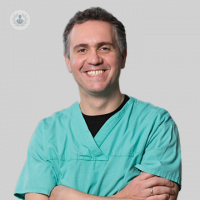Cardioverter defibrillator: A solution for dangerously abnormal heartbeats
Escrito por:If you suffer from heart rhythm issues, it can be quite scary – especially if it’s life-threatening. Luckily, there’s a device that can significantly improve heartbeat irregularities. We spoke with Dr Oliver Guttmann, a leading Consultant Cardiologist to discuss the implantation of a cardioverter defibrillator. It’s similar to a pacemaker, however, it also contains a computer that can track your heart rate and rhythm and treat the heart rhythm if needed.


What is the benefit of a cardioverter defibrillator (ICD)?
An ICD is a small electrical device. It is used to treat some types of abnormal life-threatening heart rhythms, which can lead to cardiac arrest. It checks your heart rhythm all the time and can give your heart electric signals or shocks to get your heart rhythm back to normal again.
You might need an ICD if you have had a life-threatening heart rhythm abnormality. This can happen suddenly without any warning. You might be at risk of having one again.
You might have had tests, which include imaging of your heart or testing for faulty genes. These could have shown an inherited or acquired heart condition (such as hypertrophic cardiomyopathy, dilated cardiomyopathy, arrhythmogenic cardiomyopathy or myocarditis) or rhythm abnormality, which could put you at a high risk of having life-threatening heart rhythms.
You might have heart failure and low pumping function of your heart, which could also put you at high risk for dangerous heart rhythms.
How will I be asked to prepare for the procedure?
You may have several tests before you have an ICD. This includes an electrical recording of your heart rhythm (ECG), ultrasound of your heart (echocardiogram), blood tests and may include other tests such as a cardiac event recorder, electrophysiological study, a coronary angiogram or a MRI scan of your heart. Most devices are fitted as a day case. The procedure takes place in a cardiac catheter lab and takes about one hour depending on the type of device you are having.
What happens during the procedure?
You will not be able to eat or drink for a few hours before the procedure. A member of the team in the cardiac catheter lab will meet you and take you to the lab. You will meet all the members of the team including the lab technicians, nurses, radiographers and doctors. You will then be asked to lie on the cath lab table and you will be given a sedative and local anaesthetic to make sure that you are relaxed and that you are not experiencing any discomfort.
The site for the device insertion will be cleaned and sometimes shaved and then covered with a sterile drape. The doctors will then start the procedure.
A small cut is made in the skin usually under the left collarbone and the leads that go into the pumping chambers of the heart and touch the inner heart muscle are inserted. The position will be checked by X-ray and by electrical signals. Once the leads are in place, the cardiologist makes a small ‘pocket’ under your skin or muscle, where the pulse generator (a small box) is implanted. The wound will then be closed with sutures or a special glue.
What is the recovery like?
When you get back to the ward the nurse will check your blood pressure and heart rhythm and will make sure there is no bleeding, pain or swelling. You will then be allowed to sit up and walk around and to eat and drink.
You will feel some discomfort and there can be bruising around the site and you might need to take painkillers for a few days.
It is important to keep your wound dry and not to lift your arm above your shoulder for the first six weeks. You might have a chest X ray before you go home and the stitches are usually removed after one week.
You will receive an ICD identification card and a number to call if your ICD delivers a shock. The ICD is usually checked at your hospital after 4-6 weeks and then usually on a 6 monthly or yearly basis.
If you feel you could have a heart muscle condition or have queries about a pacemaker or cardioverter defibrillator, or have any issues related to your cardiovascular health, we recommend booking an appointment with a specialist such as Dr Oliver Guttmann. You can book an appointment by visiting his Top Doctors profile .


